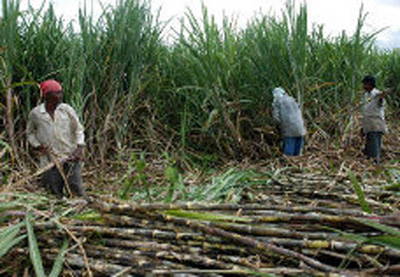
Archive 2009
|
November 16-30, 2007
Sugarcane farmers –victim of capitalist market economy
Farmers are also agitated that Statutory Minimum Price (SMP) for sugarcane is currently being decided by the financial institutions and sugar mill owners without regard for the livelihood of sugarcane growers. The farmers are demanding a new SMP that will be calculated by including a share of the profits earned by the mill owners. Earlier, sugarcane farmers of Maharashtra, Tamil Nadu and Punjab staged protests against the government demanding reimbursement of the dues against sugarcane supplied last year. Uttar Pradesh, Maharashtra and Tamil Nadu are the largest sugarcane producing states of the country. Sugarcane Control Act, 1996, clearly states that procurement money must be given within 15 days of cutting the cane. However, sugar mills invariably delay the payment to farmers. The fact that sugar mill owners are monopoly purchasers of cane in their area, ensures that the mass of cane growers are at their mercy. India’s sugar production is expected to hit a new record in 2007-08 with output forecast to be 288 lakh tonnes, up from the previous record of 274 lakh tonnes, in 2006-2007. The record production has resulted in a glut in the market, lowering sugar price and swelling up of stocks. Sugar mill owners are saying that they are not in a position to pay farmers dues as they are making losses at current sugar price. The sugar mill owners wield enormous clout with the state governments and even with the Central government. There is also a close nexus between the sugar mill owners and the biggest cane producers. In this context, the central Government has announced a relief package for sugar mills which provides for easier loans to mill owners. The aim of this relief package is ostensibly to help mills to clear the farmers’ dues. In fact, it is ensure that the profits of the mill owners are.guaranteed. Maharashtra experience Last year, the cooperative sugar mills in Maharashtra had agreed to pay Rs 1,280 per tonne for crushed cane. While Rs 900 was paid, the mills refused to pay the remaining Rs 380. A year later, Maharashtra cane growers are still fighting to receive their pending money. There was over production of cane in Maharashtra last year. The glut in production left over 30 lakh tonnes sugarcane spread over 52,000 hectares uncrushed. Dozens of canegrowers committed suicide. Sugarcane production for the coming season is slated to touch 845 lakh tonnes, up from 798 lakh tonnes last year. Maharashtra farmers fear the coming season may be even worse than last year for them. Crisis of overproduction Cane growers are victims of the crisis of overproduction. Large number of people of our country are not getting enough sugar in their daily diet because they cannot afford to buy sugar at the price it is available at. On the other side cane farmers are not able to get a remunerative price for their produce, because the market is flooded with cane and sugar. As agriculture is increasingly tied up with the international markets, and sugar is produced for export, the vagaries of the international prices of sugar also directly affect the livelihood of cane growers in India. Internationally, price of sugar is manipulated by the biggest traders in sugar. Over the years, increasing number of farmers have gone into sugarcane production, lured by the possibility of better returns as compared to other cash crops. Amongst other things, this has affected the availability of scarce water for other crops. Sugar cane production is extremely water intensive, and invariably the cost of heavy irrigation is not factored into the costs. The bourgeoisie rules India today. Its approach to peasants is that of the moneylender — to squeeze the last drop of blood. It does not care for the peasant, the soil, or the environment, but only for its profits. For a peasant to expect that this government of the bourgeoisie will do something to safeguard his livelihhod will not be wise. Peasants need to join hands with workers to establish a government of workers and peasants, which will reorient the economy with the aim of fulfilling the needs of people, and guaranteeing livelihood for the farmers. It is quite possible to plan how much of what crops should be sown where, so that all the requirements of the people are satisfied. Workers and peasants are quiet capable of settling all such issues, including what should be remunerative price for a particular cash crop in a particular region, and what should workers be paid for their labour in each sector of the economy. |

